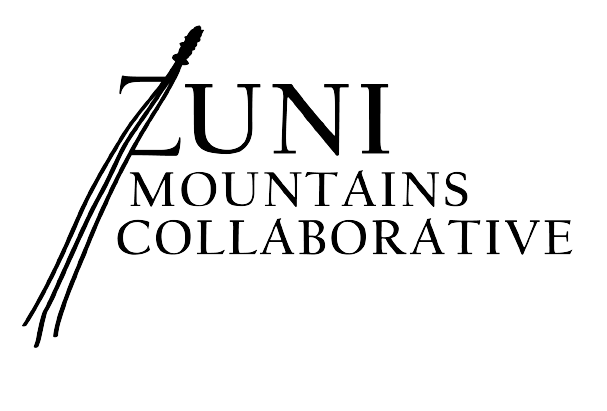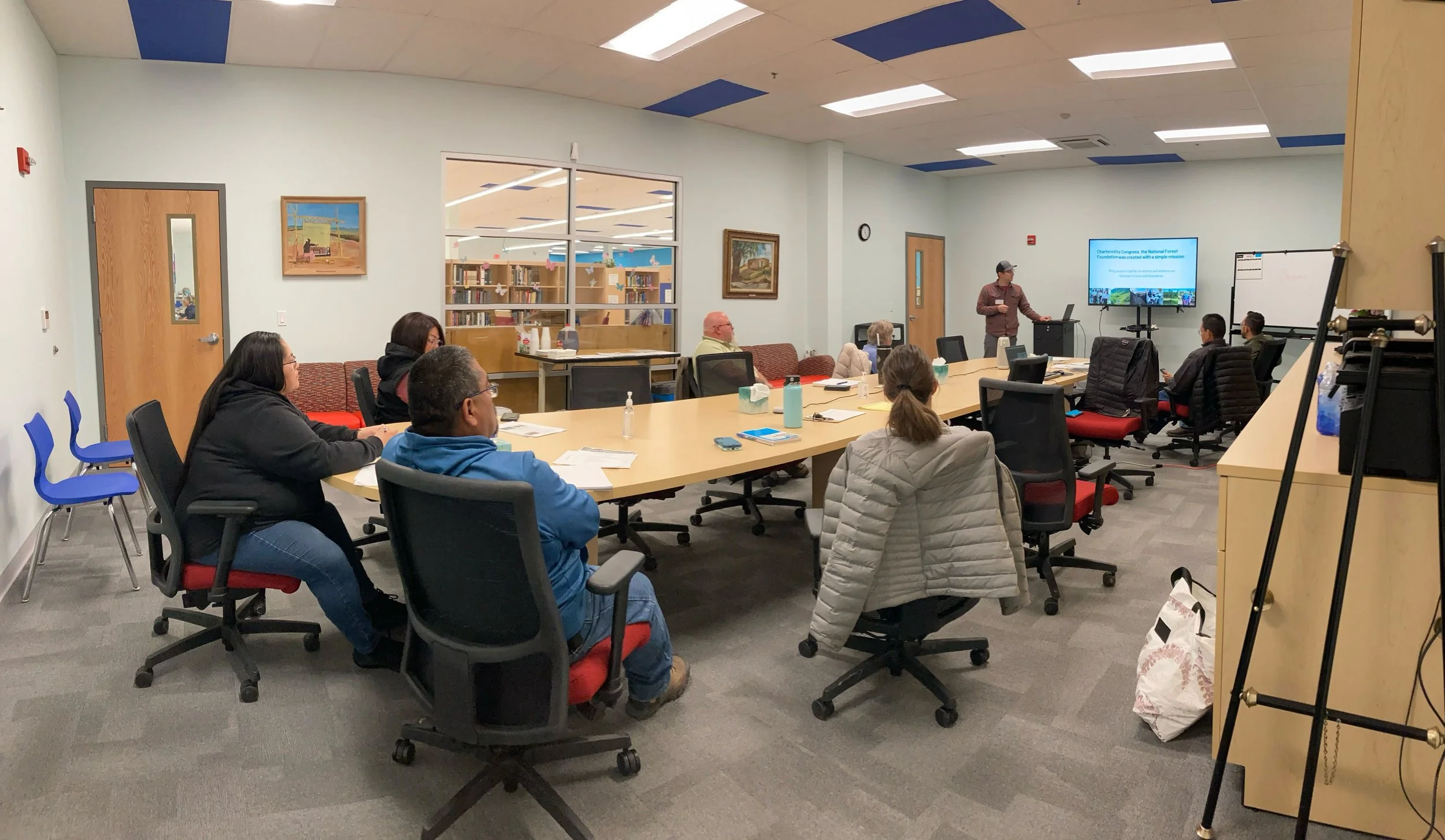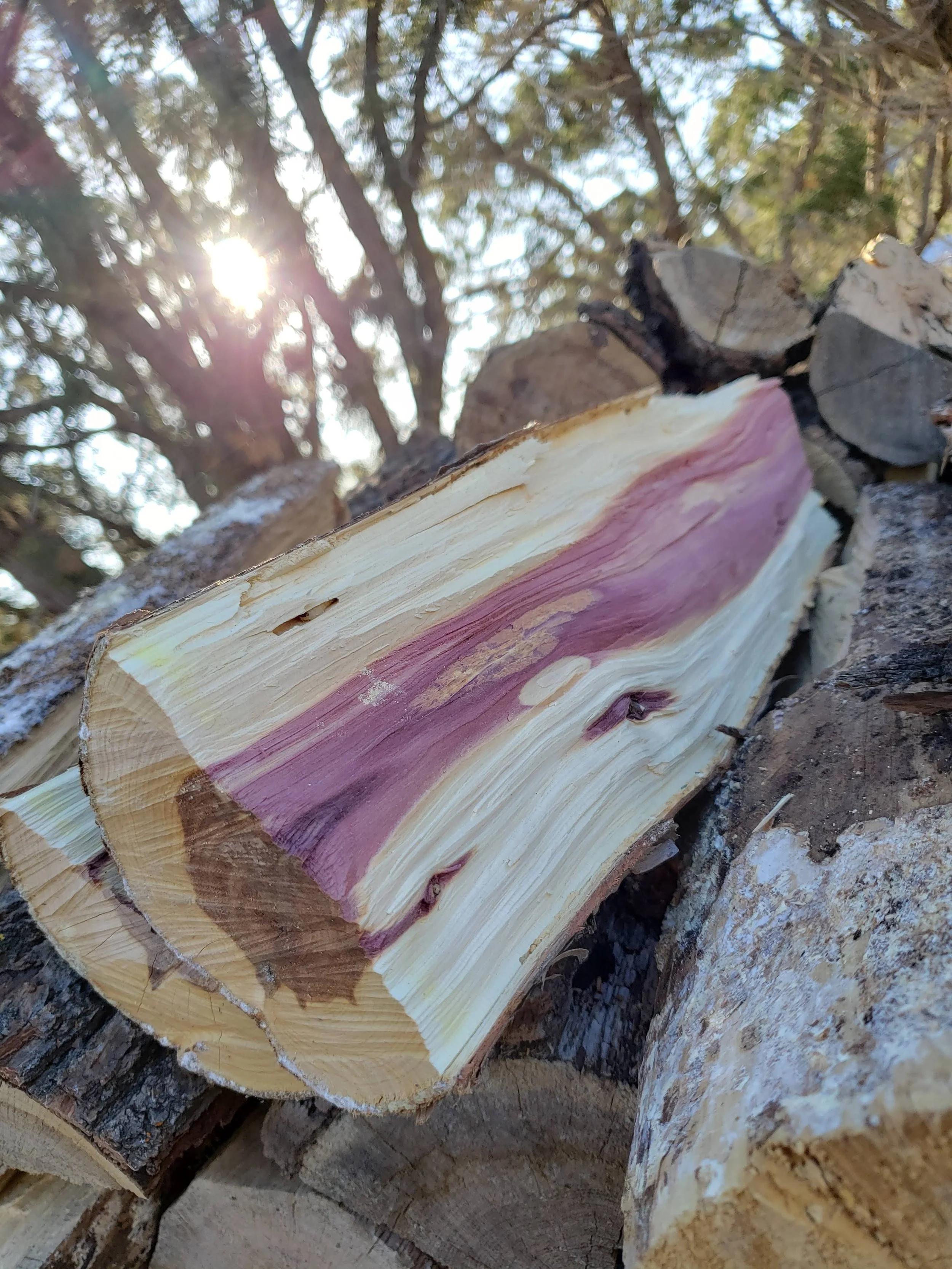Since time immemorial, the forests of the Zuni Mountains and the surrounding landscape have provided a bounty of “resources” for Indigenous and traditional communities of west central New Mexico. Firewood collection is an important sustenance and cultural activity with the added benefit of reducing flammable organic fuel loads, in turn helping mitigate wildfire risk. The Zuni Mountains remain a rural and majority Indigenous and Hispanic area where many households rely on fuelwood to heat their homes and cook during New Mexico’s long winters and to perform cultural activities year-round.
A deck of logs from a forest thinning project waiting to be transported to a wood mill or community wood bank.
For years, there has been a mismatch: households don’t reliably have enough wood (or enough money to buy wood) to last them through the cold season and land managers, following a century of fire suppression, have overgrown forests with too many trees on the landscape. With thousands of acres of National Forest, State Trust, and private lands being (or needing to be) thinned each year to reduce hazardous fuels and restore forested ecosystems, the Zuni Mountains Collaborative Forest Landscape Restoration Program (CFLRP) presents a unique cooperative opportunity to direct these cut trees to meet community fuelwood needs. Cutting logs to length where they can be handled, processing the wood, and transporting it to communities in need requires significant coordination and planning, which is why leadership of the Zuni Mountains Collaborative created a Wood Utilization and Community Fuelwood (WUCF) working group in mid-2023.
A small stack of fuelwood consisting primarily of pinyon, juniper, and oak. Many families require 6-10 cords of wood to heat their homes through a single winter.
The working group’s efforts build on an impressive body of work in this area, most notably that of Chizh for Cheii (“Wood for Grandpa” in Navajo), a local grassroots organization founded by Navajo Tribal member Loren Anthony in 2011. Chizh for Cheii leverages volunteers, transportation infrastructure, and strategic partnerships to collect and distribute firewood to Navajo elders free of charge. In parallel, the National Forest Foundation (NFF) has created its Wood for Life program to invest in this same issue. NFF and the United States Forest Service (USFS) are now working in partnership across the Southwest to transport downed trees from restoration projects free of charge to Indigenous partners for processing and distribution. Recently, the USFS and NFF signed a shared stewardship agreement to bring the Wood for Life program to the Zuni Mountains. Around the time that NFF and the Forest Service (USFS) began discussing their agreement, the Forest Stewards Guild (the Guild) started working with the USFS to generate a detailed assessment of each community’s fuelwood needs and capacity gaps in wood storage, processing, and other infrastructure. Many of these aligned efforts have since converged and NFF, the Guild, the USFS, Chizh for Cheii, and other partners are now working together to bolster existing community woodbanks, to create new ones, to establish working partnerships and resource sharing agreements between communities, and to provide free wood to those in who have an unmet need. Taken together, these efforts represent a major opportunity to create a sustainable model that guarantees community access to fuelwood in the Zuni Mountains.
Manny Lopez presents during the March 2024 Fuelwood Bank Workshop in Grants.
This partnership kicked off with a hybrid in-person/virtual Fuelwood Bank Workshop in March 2024 hosted by the Guild, NFF, and the USFS. Participants discussed ways to create space for a backup wood supply, while Shirley Piqosa of Pueblo of Acoma highlighted the challenges, opportunities, and lessons learned from Acoma’s fuelwood distribution program. Manny Lopez of NFF detailed the benefits of the Wood for Life program that will now be extended to Zuni Mountains communities.
These efforts are coalescing around the designation of several wood bank “hubs” located close to the Zuni Mountains. The demands put on these hubs are higher than a typical wood bank as they must be willing and able to receive, process (cut and split into firewood size pieces), and redistribute 5-15 truckloads of logs containing 35-150 cords of wood, once processed, per summer. Hubs simplify the logistics of redistributing fuelwood to nearby communities by concentrating the process at a central location, but they also experience a greater need for financial and physical resources to process, store, and distribute the wood. To this end, the Guild and NFF are offering some small grants and other assistance to wood bank hubs and smaller community wood banks in the landscape to purchase equipment, pay for fuel and maintenance, help transport wood, and organize volunteer labor to process the wood.
Please join us for a Community Work Day on October 9th when the Guild and USFS will be talking about chainsaw and forest safety and helping attendees split and load fuelwood in the Cibola National Forest near McGaffey Lake. There is no RSVP for this event. To learn more about the work day or about community fuelwood and wood utilization efforts in the Zuni Mountains, please contact the Guild’s Wood Utilization Coordinator, Juan Lemos, at juan@forestguild.org.





